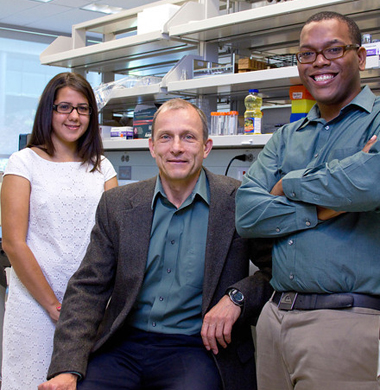UAlbany International Expert Teams Up with Puerto Rican University to Advance Groundbreaking Alzheimer’s Research
 |
|
University of Puerto Rico, Mayaguez, graduate students Tatiana Quiñones-Ruiz (left) and Manuel F. Rosario-Alomar flank UAlbany Chemist Igor Lednev. The two students collaborated with Lednev this summer on brain research related to Alzheimer's disease. (Photo by Paul Miller) |
ALBANY, N.Y. (July 26, 2013) – University at Albany chemist Igor Lednev, an international expert in laser spectroscopy, is attracting leading laboratories worldwide to collaborate on amyloid fibrils research as it relates to Alzheimer’s disease.
Through one of his 14 active collaborations with laboratories in the U.S. and Europe, Lednev recently attracted two graduate students to UAlbany from the University of Puerto Rico, Mayaguez (UPRM) to aid in a study regarding how hydrogen sulfide (H2S), a poisonous gas, may inhibit the formation of misfolded protein clumps (amyloids) in the brain that are believed to cause Alzheimer’s disease.
In conjunction with Lednev, UPRM students Manuel F. Rosario-Alomar and Tatiana Quiñones-Ruiz are investigating how H2S serves within the brain as a neuromodulator and a smooth muscle relaxant. Studies have shown that H2S levels are severely decreased in the brains of Alzheimer’s disease patients compared to the brains of healthy individuals.
Rosario-Alomar and Quiñones-Ruiz are utilizing Lednev’s Deep UV Resonant Raman (DUVRR) spectroscopic apparatus to uncover new information about how H2S may affect the formation of amyloid plaques. Since building his Raman spectroscopic apparatus in 2004, Lednev, has secured more than $2 million in federal funding for the amyloid project from the National Institutes of Health and National Science Foundation.
His Raman spectroscopy research with amyloids could ultimately yield new insights into other neurodegenerative diseases such as Parkinson’s and Huntington’s.
New Discoveries
The two students, working with 2012 UAlbany PhD graduate Dmitry Kurouski and two undergraduate researchers from Brazil, Eduardo de Barros Ferreira and Rafael Amaral de Araujo, have already discovered that hydrogen disulfide prevents formation of amyloid fibrils in vitro.
“This discovery is very exciting because it may shed light on the biochemical mechanism of Alzheimer’s disease and the physiological role of hydrogen sulfide,” said Lednev. “This is truly a team effort and has offered an excellent opportunity for these students to perform cutting-edge research.”
Quiñones-Ruiz, just accepted to UAlbany’s chemistry PhD program, worked on collaborative research at UPRM involving Lednev and UPRM chemists, Juan López-Garriga and Samuel Hernandez.
Rosario-Alomar, a PhD student at UPRM, is at UAlbany via an internship supported by the National Institutes of Health- Research Initiative for Scientific Enhancement (NIH-RISE), a student-development program designed to increase the number of students from groups underrepresented in biomedical and behavioral research careers.
Lednev was selected to participate in the NIH-RISE program after successfully demonstrating to NIH that participants would be engaged in meaningful research experiences in the laboratory of an active investigator who has extramural support and is published in peer-reviewed journals. López-Garriga and Hernandez, who received the NIH-RISE grant, invited Lednev to participate in the program.
“We feel very good about being the first generation of students from Puerto Rico to work in life sciences at UAlbany,” said Rosario-Alomar, who hopes to continue onto a postdoctoral position at UAlbany after his NIH-RISE internship. “Tatiana and I are eager to let prospective students at UPRM know about the great opportunities available at UAlbany.”
![]() For more news, subscribe to UAlbany's RSS headline feeds
For more news, subscribe to UAlbany's RSS headline feeds
A comprehensive public research university, the University at Albany-SUNY offers more than 120 undergraduate majors and minors and 125 master's, doctoral and graduate certificate programs. UAlbany is a leader among all New York State colleges and universities in such diverse fields as atmospheric and environmental sciences, business, education, public health,health sciences, criminal justice, emergency preparedness, engineering and applied sciences, informatics, public administration, social welfare and sociology, taught by an extensive roster of faculty experts. It also offers expanded academic and research opportunities for students through an affiliation with Albany Law School. With a curriculum enhanced by 600 study-abroad opportunities, UAlbany launches great careers.


